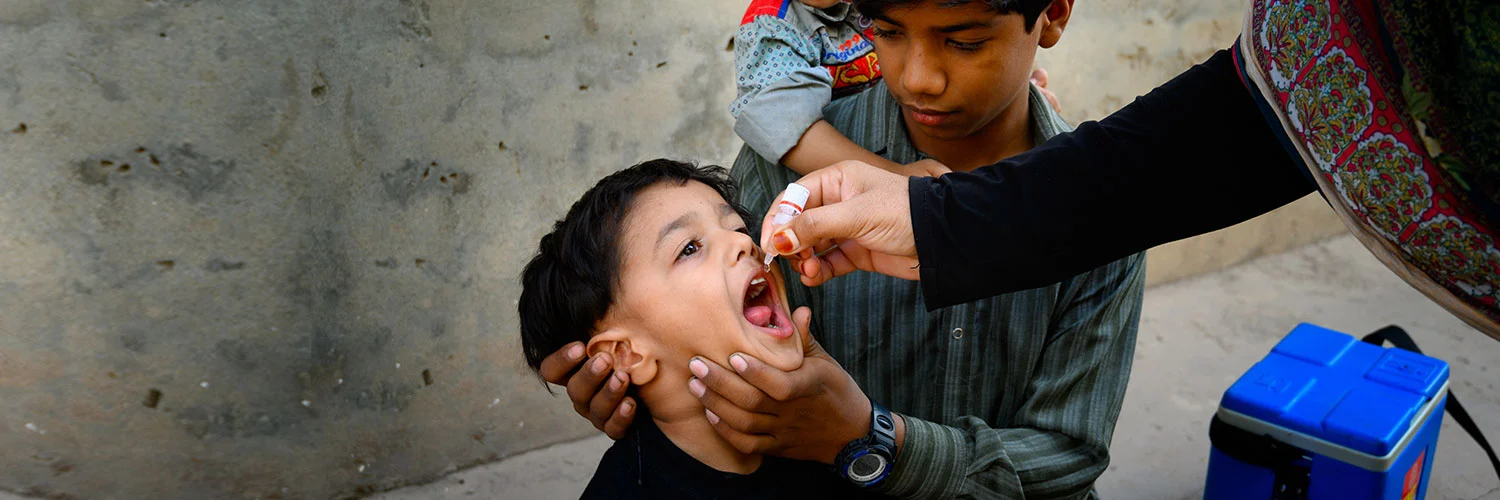The Pakistan Polio Eradication Programme is a public-private partnership led by The Government of Pakistan, and spearheaded by partners such as the World Health Organization (WHO), the United Nations Children's Fund (UNICEF), Bill & Melinda Gates Foundation (BMGF), Rotary International and the US Centers for Disease Control and Prevention (CDC).
The Pakistan Polio Eradication Programme has always been driven by strong Government commitment and leadership. Such commitment and leadership has been critical to ensuring that polio eradication remains a top priority under each Government and has unwavering support from across the political spectrum. Government management and oversight has sustained programme operations at every level, including functionality and coordination across National and Provincial Emergency Operation Centres, the National Task Force, Provincial Task Forces, Divisional Task Forces, and District Polio Control Rooms.
The Caretaker Federal Minister of Health of Pakistan, Dr. Nadeem Jan, maintains direct oversight for the implementation of the annual National Emergency Action Plan (NEAP) for Polio Eradication at the national and provincial level. He also provides strategic guidance and support to polio eradication with the assistance of the Ministry of National Health Services Regulations and Coordination. All operational oversight is provided by the National Emergency Coordinator at the National Emergency Operations Centre, Dr. Shahzad Baig, in collaboration with all Provincial Emergency Operations Centre Coordinators situated in the provinces.
Rotary International is the world's first and largest humanitarian service organization, with a global network of 1.2 million members in more than 200 countries.
Through its PolioPlus programme, established in 1985, Rotary became one the first organizations to envisage a polio-free world. More than one million Rotary members have volunteered their time and personal resources to polio eradication.
Rotary members have also provided valuable field support during National Immunization Days through social mobilization activities and by administering the oral polio vaccine to children.
To read more about Rotary International and the Pakistan Polio Eradication Programme,
WHO coordinates the major strategic planning, management and administration processes of the Global Polio Eradication Initiative (GPEI). WHO is responsible for the systematic collection, collation and dissemination of standardized information on strategy implementation and impact, particularly in the areas of surveillance and supplementary immunization activities.
WHO also coordinates operational and basic research, provides technical and operational support to the Ministry of Health, and coordinates training and deployment of human resources for supplementary technical assistance.
In addition, WHO has a lead role in establishing certification-standard surveillance of acute flaccid paralysis (AFP), resource mobilization, donor coordination, advocacy and communications. WHO serves as a secretariat for the certification process and facilitates implementation and monitoring of biocontainment activities.
To read more about World Health Organization (WHO) and the Pakistan Polio Eradication Programme,
UNICEF procures and distributes polio vaccines for routine and supplementary immunizations. In addition, UNICEF supports Pakistan in the implementation of intensified National Immunization Days. (NIDs) and Sub-National Immunization Days (SNIDs), and mop-up campaigns through the funding of more than 20,000 community-based vaccinators, nearly all female (allowing the vaccinators to immunize children who are “inside the home”).
UNICEF also helps the Pakistan Polio Eradication Programme develop communication strategies that are vital in encouraging local acceptance of the vaccine.
UNICEF also assists in developing action plans and securing logistical access to hard-to-reach places, especially in countries affected by conflict. UNICEF contributes to the development of eradication policies, plans of action, training materials and public information, while also being an active partner in advocacy and resource mobilization.
To read more about UNICEF and immunization programmes,
Polio eradication is a top priority of the Bill & Melinda Gates Foundation. As a major supporter of the Global Polio Eradication Initiative (GPEI), it contributes technical and financial resources to partners to accelerate efforts to eradicate polio.
The Foundation is also working with partners on innovative ways to enhance polio surveillance and outbreak response, accelerate the development and use of safer and more effective polio vaccines, while also galvanizing financial and political support for polio eradication efforts from both donor and polio-affected countries.
To read more about Bill & Melinda Gates Foundation and Polio Eradication Programme,
Additional polio partners, including Canada/CIDA, UK Aid/DFID, Islamic Development Bank, Japan/JICA, UAE UPAP, UAE Crown Prince Court, UNICEF Executive Director Set-Aside Fund, and USAID, also generously support the programme.






